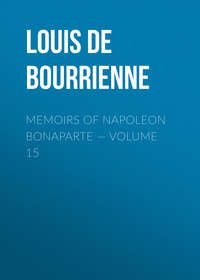 полная версия
полная версияMemoirs of Napoleon Bonaparte — Volume 12

Louis Antoine Fauvelet de Bourrienne
Memoirs of Napoleon Bonaparte — Volume 12
CHAPTER XXVIII
1813.
Riots in Hamburg and Lubeck—Attempted suicide of M. Konning— Evacuation of Hamburg—Dissatisfaction at the conduct of General St. Cyr—The Cabinets of Vienna and the Tuileries—First appearance of the Cossacks—Colonel Tettenborn invited to occupy Hamburg—Cordial reception of the Russians—Depredations—Levies of troops— Testimonials of gratitude to Tettenborn—Napoleon's new army—Death of General Morand—Remarks of Napoleon on Vandamme—Bonaparte and Gustavus Adolphus—Junction of the corps of Davoust and Vandamme— Reoccupation of Hamburg by the French—General Hogendorff appointed Governor of Hamburg—Exactions and vexatious contributions levied upon Hamburg and Lubeck—Hostages.
A considerable time before Napoleon left Paris to join the army, the bulk of which was in Saxony, partial insurrections occurred in many places. The interior of France proper was indeed still in a state of tranquillity, but it was not so in the provinces annexed by force to the extremities of the Empire, especially in the north, and in the unfortunate Hanse Towns, for which, since my residence at Hamburg, I have always felt the greatest interest. The intelligence I received was derived from such unquestionable sources that I can pledge myself for the truth of what I have to state respecting the events which occurred in those provinces at the commencement of 1813; and subsequently I obtained a confirmation of all the facts communicated by my correspondence when I was sent to Hamburg by Louis XVIII. in 1815.
M. Steuve, agent from the Court of Russia, who lived at Altona apparently as a private individual, profited by the irritation produced by the measures adopted at Hamburg. His plans were so well arranged that he was promptly informed of the route of the Grand Army from Moscow, and the approach of the Allied troops. Aided by the knowledge and activity of Sieur Hanft of Hamburg, M. Steuve profited by the discontent of a people so tyrannically governed, and seized the opportunity for producing an explosion. Between eight and nine o'clock on the morning of the 24th of February 1813 an occurrence in which the people were concerned was the signal for a revolt. An individual returning to Hamburg by the Altona gate would not submit to be searched by a fiscal agent, who in consequence maltreated him and wounded him severely. The populace instantly rose, drove away the revenue guard, and set fire to the guard- house. The people also, excited by secret agents, attacked other French posts, where they committed the same excesses. Surprised at this unexpected movement, the French authorities retired to the houses in which they resided. All the respectable inhabitants who were unconnected with the tumult likewise returned to their homes, and no person appeared out of doors.
General Carry St. Cyr had the command of Hamburg after the Prince of Eckmuhl's departure for the Russian campaign.
—[General Carry St. Cyr is not to be contused with the Marshal Gonvion de St. Cyr; he fell into disgrace for his conduct at Hamburg at this time, and was not again employed by Napoleon. Under the Restoration he became Governor of French Guiana.]—
At the first news of the revolt he set about packing up his papers, and Comte de Chaban, M. Konning, the Prefect of Hamburg, and M. Daubignosc, the Director of Police, followed his example. It was not till about four o'clock in the afternoon that a detachment of Danish hussars arrived at Hamburg, and the populace: was then speedily dispersed. All the respectable citizens and men of property assembled the next morning and adopted means for securing internal tranquillity, so that the Danish troops were enabled to return to Altona. Search was then made for the ringleaders of the disturbance. Many persons were arrested, and a military commission, ad hoc; was appointed to try them. The commission, however, condemned only one individual, who, being convicted of being one of the most active voters, was sentenced to be shot, and the sentence was carried into execution.
On the 26th February a similar commotion took place at Lubeck. Attempts were made to attack the French Authorities. The respectable citizens instantly assembled, protected them against outrage, and escorted them in safety to Hamburg, where they arrived on the 27th. The precipitate flight of these persons from Lubeck spread some alarm in Hamburg. The danger was supposed to be greater than it was because the fugitives were accompanied by a formidable body of troops.
But these were not the only attempts to throw off the yoke of French domination, which had become insupportable. All the left bank of the Elbe was immediately in a state of insurrection, and all the official persons took refuge in Hamburg. During these partial insurrections everything was neglected. Indecision, weakness, and cupidity were manifested everywhere. Instead of endeavours to soothe the minds of the people, which had been, long exasperated by intolerable tyranny, recourse was had to rigorous measures. The prisons were crowded with a host of persons declared to be suspected upon the mere representations of the agents of the police. On the 3d of March a special military commission condemned six householders of Hamburg and its neighbourhood to be shot on the glacis for no other offence than having been led, either by chance or curiosity, to a part of the town which was the scene of one of the riots. These executions excited equal horror and indignation, and General Carra St. Cyr was obliged to issue a proclamation for the dissolution of the military commission by whom the men had been sentenced.
The intelligence of the march of the Russian and Prussian troops; who were descending the Elbe, increased the prevailing agitation in Westphalia, Hanover, Mecklenburg, and Pomerania, and all the French troops cantoned between Berlin and Hamburg, including those who occupied the coast of the Baltic, fell back upon Hamburg. General Carra St. Cyr and Baron Konning, the Prefect of Hamburg, used to go every evening to Altona. The latter, worn out by anxiety and his unsettled state of life, lost his reason; and on his way to Hamburg, on the 5th of May, he attempted to cut his throat with a razor. His 'valet de chambre' saved his life by rushing upon him before he had time to execute his design. It was given out that he had broken a blood-vessel, and he was conveyed to Altona, where his wound was cured, and he subsequently recovered from his derangement. M. Konning, who was a native of Holland, was a worthy man, but possessed no decision of character, and but little ability.
At this juncture exaggerated reports were circulated respecting the approach of a Russian corps. A retreat was immediately ordered, and it was executed on the 12th of March. General Carra St. Cyr having no money for the troops, helped himself to 100,000 francs out of the municipal treasury. He left Hamburg at the head of the troops and the enrolled men of the custom-house service. He was escorted by the Burgher Guard, which protected him from the insults of the populace; and the good people of Hamburg never had any visitors of whom they were more happy to be rid.
This sudden retreat excited Napoleon's indignation. He accused General St. Cyr of pusillanimity, in an article inserted in the 'Moniteur', and afterwards copied by his order into all the journals. In fact, had General St. Cyr been better informed, or less easily alarmed, he might have kept Hamburg, and prevented its temporary occupation by the enemy, to dislodge whom it was necessary to besiege the city two months afterwards. St. Cyr had 3000 regular troops, and a considerable body of men in the custom-house service. General Morand could have furnished him with 5000 men from Mecklenburg. He might, therefore, not only have kept possession of Hamburg two months longer, but even to the end of the war, as General Lexnarrois retained possession of Magdeburg. Had not General St. Cyr so hastily evacuated the Elbe he would have been promptly aided by the corps which General Vandamme soon brought from the Wesel, and afterwards by the very, corps with which Marshal Davoust recaptured Hamburg.
The events just described occurred before Napoleon quitted Paris. In the month of August all negotiation was broken off with Austria, though that power, still adhering to her time-serving policy, continued to protest fidelity to the cause of the Emperor Napoleon until the moment when her preparations were completed and her resolution formed. But if there was duplicity at Vienna was there not folly, nay, blindness, in the Cabinet of the Tuileries? Could we reasonably rely upon Austria? She had seen the Russian army pass the Vistula and advance as far as the Saale without offering any remonstrance. At that moment a single movement of her troops, a word of declaration, would have prevented everything. As, therefore, she would not avert the evil when she might have done so with certainty and safety, there must have been singular folly and blindness in the Cabinet who saw this conduct and did not understand it.
I now proceed to mention the further misfortunes which occurred in the north of Germany, and particularly at Hamburg. At fifteen leagues east of Hamburg, but within its territory, is a village named Bergdorf. It was in that village that the Cossacks were first seen. Twelve or fifteen hundred of them arrived there under the command of Colonel Tettenborn. But for the retreat of the French troops, amounting to 3000, exclusive of men in the customhouse service, no attempt would have been made upon Hamburg; but the very name of the Cossacks inspired a degree of terror which must be fresh in the recollection of every one. Alarm spread in Hamburg, which, being destitute of troops and artillery, and surrounded with dilapidated fortifications, could offer no defence. The Senator Bartch and Doctor Know took upon themselves to proceed to Bergdorf to solicit Colonel Tettenborn to take possession of Hamburg, observing that they felt sure of his sentiments of moderation, and that they trusted they would grant protection to a city which had immense commercial relations with Russia. Tettenborn did not place reliance on these propositions because he could not suppose that there had been such a precipitate evacuation; he thought they were merely a snare to entrap him, and refused to accede to them. But a Doctor Von Hess, a Swede, settled. in Hamburg some years, and known to Tettenborn as a decided partisan of England and Russia, persuaded the Russian Commander to comply with the wishes of the citizens of Hamburg. However, Tettenborn consented only on the following conditions:—That the old Government should be instantly re-established; that a deputation of Senators in their old costume should invite him to take possession of Hamburg, which he would enter only as a free and Imperial Hanse Town; that if those conditions were not complied with he would regard Hamburg as a French town, and consequently hostile. Notwithstanding the real satisfaction with which the Senators of Hamburg received those propositions they were restrained by the fear of a reverse of fortune. They, however, determined to accept them, thinking that whatever might happen they could screen themselves by alleging that necessity had driven them to the step they took. They therefore declared their compliance with the conditions, and that night and the following day were occupied in assembling the Senate, which had been so long dissolved, and in making the preparations which Tettenborn required.
At four o'clock in the afternoon of the 17th of March a picket of Cossacks, consisting of only forty men, took possession of a town recently flourishing, and containing a population of 124,000, but ruined and reduced to 80,000 inhabitants by the blessing of being united to the French Empire. On the following day, the 18th, Colonel Tettenborn entered Hamburg at the head of 1000 regular and 200 irregular Cossacks. I have described the military situation of Hamburg when it was evacuated on the 12th of March, and Napoleon's displeasure may be easily conceived. Tettenborn was received with all the honours usually bestowed upon a conqueror. Enthusiasm was almost universal. For several nights the people devoted themselves to rejoicing. The Cossacks were gorged with provisions and drink, and were not a little astonished at the handsome reception they experienced.
It was not until the expiration of three or four days that the people began to perceive the small number of the allied troops. Their amount gradually diminished. On the day after the arrival of the Cossacks a detachment was sent to Lubeck, where they were received with the same honours as at Hamburg. Other detachments were sent upon different places, and after four days' occupation there remained in Hamburg only 70 out of the 1200 Cossacks who had entered on the 18th March.
The first thing their commander did was to take possession of the post- office and the treasuries of the different public offices. All the movable effects of the French Government and its agents were seized and sold. The officers evinced a true Cossack disregard of the rights of private property. Counts Huhn, Buasenitz, and Venechtern, who had joined Tettenborn's staff, rendered themselves conspicuous by plundering the property of M. Pyonnier, the Director of the Customs, and M. Gonae, the Postmaster, and not a bottle of wine was left in their cellars. Tettenborn laid hands upon a sum of money, consisting of upwards of 4000 Louis in gold, belonging to M. Gonse, which had been lodged with M. Schwartz, a respectable banker in Hamburg, who filled the office of Prussian Consul. M. Schwartz, with whom this money had been deposited for the sake of security, had also the care of some valuable jewels belonging to Mesdames Carry St. Cyr and Daubignoac; Tettenborn carried off these as well as the money. M. Schwartz remonstrated in his character of Prussian Consul, Prussia being the ally of Russia, but he was considered merely as a banker, and could obtain no redress. Tettenborn, like most of the Cossack chiefs, was nothing but a man for blows and pillage, but the agent of Russia was M. Steuve, whose name I have already mentioned.
Orders were speedily given for a levy of troops, both in infantry and cavalry, to be called Hanseatic volunteers. A man named Hanft, who had formerly been a butcher, raised at his own expense a company of foot and one of lancers, of which he took the command. This undertaking, which cost him 130,000 francs, may afford some idea of the attachment of the people of Hamburg to the French Government! But money, as well as men, was wanting, and a heavy contribution was imposed to defray the expense of enrolling a number of workmen out of employment and idlers, of various kinds. Voluntary donations were solicited, and enthusiasm was so general that even servant-maids gave their rings. The sums thus collected were paid into the chest of Tettenborn's staff, and became a prey to dishonest appropriation. With respect to this money a Sieur Oswald was accused of not having acted with the scrupulous delicacy which Madame de Stael attributes to his namesake in her romance of Corinne.
Between 8000 and 10,000 men were levied in the Hanse Towns and their environs, the population of which had been so greatly reduced within two years. These undisciplined troops, who had been for the most part levied from the lowest classes of society, committed so many outrages that they soon obtained the surname of the Cossacks of the Elbe; and certainly they well deserved it.
Such was the hatred which the French Government had inspired in Hamburg that the occupation of Tettenborn was looked upon as a deliverance. On the colonel's departure the Senate, anxious to give high a testimonial of gratitude, presented him with the freedom of the city, accompanied by 5000 gold fredericks (105,000 francs), with which he was doubtless much more gratified than with the honour of the citizenship.
The restored Senate of Hamburg did not long survive. The people of the Hanse Towns learned, with no small alarm, that the Emperor was making immense preparations to fall upon Germany, where his lieutenants could not fail to take cruel revenge on those who had disavowed his authority. Before he quitted Paris on the 15th of April Napoleon had recalled under the banners of the army 180,000 men, exclusive of the guards of honour, and it was evident that with such a force he might venture on a great game, and probably win it. Yet the month of April passed away without the occurrence of any event important to the Hanse Towns, the inhabitants of which vacillated between hope and fear. Attacks daily took place between parties of Russian and French troops on the territory between Lunenburg and Bremen. In one of these encounters General Morand was mortally wounded, and was conveyed to Lunenburg. His brother having been taken prisoner in the same engagement, Tettenborn, into whose hands he had fallen, gave him leave on parole to visit the General; but he arrived in Lunenburg only in time to see him die.
The French having advanced as far as Haarburg took up their position on the plateau of Schwartzenberg, which commands that little town and the considerable islands situated in that part of the river between Haarburg and Hamburg. Being masters of this elevated point they began to threaten Hamburg and to attack Haarburg. These attacks were directed by Vandamme, of all our generals the most redoubtable in conquered countries. He was a native of Cassel, in Flanders, and had acquired a high reputation for severity. At the very time when he was attacking Hamburg Napoleon said of him at Dresden, "If I were to lose Vandamme I know not what I would give to have him back again; but if I had two such generals I should be obliged to shoot one of them." It must be confessed that one was quite enough.
As soon as he arrived Vandamme sent to inform Tettenborn that if he did not immediately liberate the brother and brother-in-law of Morand, both of whom were his prisoners, he would burn Hamburg. Tettenborn replied that if he resorted to that extremity he would hang them both on the top of St. Michael's Tower, where he might have a view of them. This energetic answer obliged Vandamme to restrain his fury, or at least to direct it to other objects.
Meanwhile the French forces daily augmented at Haarburg. Vandamme, profiting by the negligence of the new Hanseatic troops, who had the defence of the great islands of the Elbe, attacked them one night in the month of May. This happened to be the very night after the battle of Lutzsn, where both sides claimed the victory; and Te Deum was sung in the two hostile camps. The advance of the French turned the balance of opinion in favour of Napoleon, who was in fact really the conqueror on a field of battle celebrated nearly two centuries before by the victory and death of Gustavus Adolphus. The Cossacks of the Elbe could not sustain the shock of the French; Vandamme repulsed the troops who defended Wilhelmsburg, the largest of the two islands, and easily took possession of the smaller one, Fidden, of which the point nearest the right bank of the Elbe is not half a gunshot distant from Hamburg. The 9th of May was a fatal day to the people of Hamburg; for it was then that Davoust, having formed his junction with Vandamme, appeared at the head of a corps of 40,000 men destined to reinforce Napoleon's Grand Army. Hamburg could not hold out against the considerable French force now assembled in its neighbourhood. Tettenborn had, it is true, received a reinforcement of 800 Prussians and 2000, Swedes, but still what resistance could he offer to Davoust's 40,000 men? Tettenborn did not deceive himself as to the weakness of the allies on this point, or the inutility of attempting to defend the city. He yielded to the entreaties of the inhabitants, who represented to him that further resistance must be attended by certain ruin. He accordingly evacuated Hamburg on the 29th of May, taking with him his Hanseatic legions, which had not held out an hour in the islands of the Elbe, and accompanied by the Swedish Doctor Von Hess, whose imprudent advice was the chief cause of all the disasters to which the unfortunate city lied been exposed.
Davoust was at Haarburg, where he received the deputies from Hamburg with an appearance of moderation; and by the conditions stipulated at this conference on the 30th of May a strong detachment of Danish troops occupied Hamburg in the name of the Emperor. The French made their entrance the same evening, and occupied the posts as quietly as if they had been merely changing guard. The inhabitants made not a shadow of resistance. Not a drop of blood was issued; not a threat nor an insult was interchanged. This is the truth; but the truth did not suit Napoleon. It was necessary to getup a pretext for revenge, and accordingly recourse was had to a bulletin, which proclaimed to France and Europe that Hamburg had been taken by main force, with a loss of some hundred men. But for this imaginary resistance, officially announced, how would it have been possible to justify the spoliations and exactions which ensued?
The Dutch General, Hogendorff, became Governor of Hamburg in lieu of Carra St. Cyr, who had been confined at Osnabruck since his precipitate retreat. General Hogendorff had been created one of the Emperor's aides de camp, but he was neither a Rapp, a Lauriston, nor a Duroc. The inhabitants were required to pay all the arrears of taxes due to the different public offices during the seventy days that the French had been absent; and likewise all the allowances that would have been paid to the troops of the garrison had they remained in Hamburg. Payment was also demanded of the arrears for the quartering of troops who were fifty leagues off. However, some of the heads of the government departments, who saw and understood the new situation of the French at Hamburg, did not enforce these unjust and vexatious measures. The duties on registrations were reduced. M. Pyonnier, Director of the Customs, aware of the peculiar difficulty of his situation in a country where the customs were held in abhorrence, observed great caution and moderation in collecting the duties: Personal examination, which is so revolting and indecorous, especially with respect to females, was suppressed. But these modifications did not proceed from the highest quarter; they were due to the good sense of the subordinate agents, who plainly saw that if the Empire was to fall it would not be owing to little infractions in the laws of proscription against coffee and rhubarb.
If the custom-house regulations became less vexatious to the inhabitants of Hamburg it was not the same with the business of the post-office. The old manoeuvres of that department were resumed more actively than ever. Letters were opened without the least reserve, and all the old post-office clerks who were initiated in these scandalous proceedings were recalled. With the exception of the registrations and the customs the inquisitorial system, which had so long oppressed the Hanse Towns, was renewed; and yet the delegates of the French Government were the first to cry out, "The people of Hamburg are traitors to Napoleon: for, in spite of all the blessings he has conferred upon them they do not say with the Latin poet, 'Deus nobis haec otia fecit."
But all that passed was trifling in comparison with what was to come. On the 18th of June was published an Imperial decree, dated the 8th of the same month, by virtue of which were to be reaped the fruits of the official falsehood contained in the bulletin above mentioned. To expiate the crime of rebellion Hamburg was required to pay an extraordinary contribution of 48,000,000 francs, and Lubeck a contribution of 6,000,000. The enormous sum levied on Hamburg was to be paid in the short space of a month, by six equal instalments, either in money, or bills on respectable houses in Paris. In addition to this the new Prefect of Hamburg made a requisition of grain and provisions of every kind, wines, sailcloth, masts, pitch, hemp, iron, copper, steel, in short, everything that could be useful for the supply of the army and navy.
But while these exactions were made on property in Hamburg, at Dresden the liberties of individuals and even lives were attacked. On the 15th of June Napoleon, doubtless blinded by the false reports that were laid before him, gave orders for making out a list of the inhabitants of Hamburg who were absent from the city. He allowed them only a fortnight to return home, an interval too short to enable some of them to come from the places where they had taken refuge. They consequently remained absent beyond the given time. Victims were indispensable but assuredly it was not Bonaparte who conceived the idea of hostages to answer for the men whom prudence kept absent. Of this charge I can clear his memory. The hostages, were, however, taken, and were declared to be also responsible for the payment of the contribution of 48,000,000. In Hamburg they were selected from among the most respectable and wealthy men in the city, some of them far advanced in age. They were conveyed to the old castle of Haarburg on the left bank of the Elbe, and these men, who had been accustomed to all the comforts of life, were deprived even of necessaries, and had only straw to lie on. The hostages from Lubeck were taken to, Hamburg: they were placed between decks on board an old ship in the port: this was a worthy imitation of the prison hulks of England. On the 24th of July there was issued a decree which was published in the Hamburg Correspondent of the 27th. This decree consisted merely of a proscription list, on which were inscribed the names of some of the wealthiest men in the Hanse Towns, Hanover, and Westphalia.









